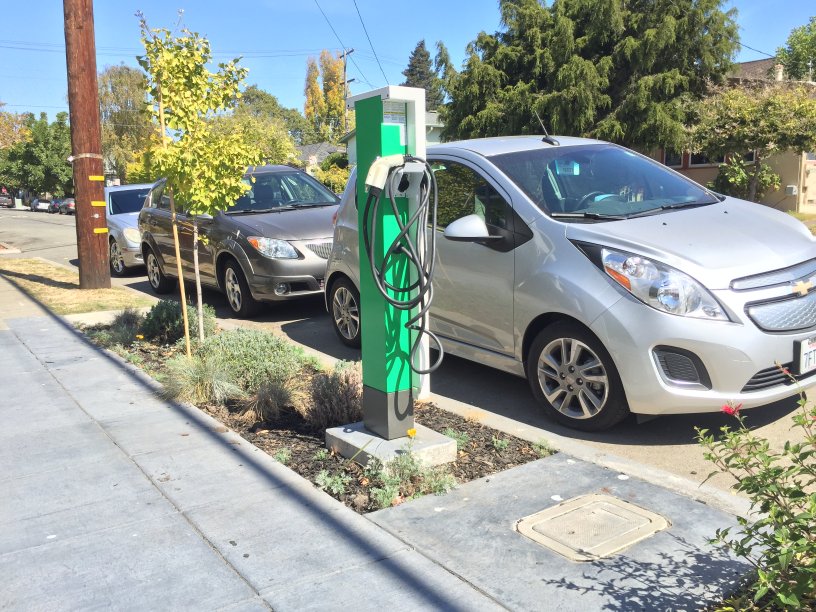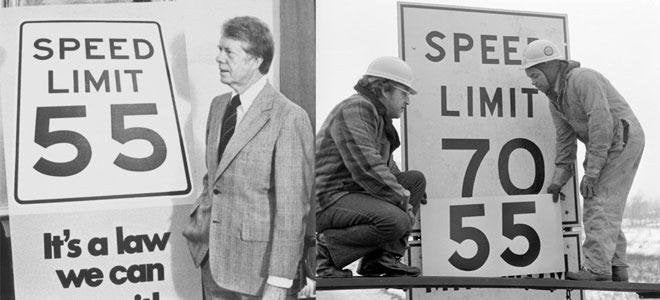To start off, I am in favor of Electric Vehicles (EVs) and I believe they will eventually replace Internal Combustion Engine (ICE) vehicles. However, government mandates to push EVs before they become cost competitive with ICE interferes with the free market and reduces prosperity.
Let's go!
EV Advantages
EVs have many technical advantages.
- Electric motors produce maximum torque at stall when it's needed most. ICE engines require complex transmissions to develop torque when the vehicle isn't moving.
- Electric motors are very simple with few moving parts. ICE engines (and their associated transmissions) are composed of hundreds (or even thousands) of parts.
- Consequently, electric motors are exceptionally durable and low maintenance.
- EVs don't have an exhaust system
- EVs utilize regenerative braking which improves efficiency and reduces wear on the brakes.
- EVs remove pollution from dense cities and transfer the pollution to rural power plants.
A Couple of Anti-EV Myths
The anti-EV folks claim that the batteries only last 8-10 years and then the cost of replacement is so great that you have to throw the vehicle away. This is a great exaggeration.
The life of a Lithium-xx battery is determined more by the number of charge cycles (i.e. miles) than the number of years. Consequently, it would be more precise to say that an EV battery will last for some number of miles. (Tesla, for example, warrants their batteries for 150,000 miles with at least 70% of original capacity). www.tesla.com/support/vehicle-warranty
This wouldn't be acceptable for someone in the far-flung burbs who drives 40k miles/year (like I did). But it is very acceptable for an urban person who drives 8-10k per year.
Secondly, it is true that present EV batteries are prohibitively expensive to replace... but they will go down in price as tech improves and alternatives to lithium, nickle and cobalt are discovered. I also think that the batteries will have salvage/recycle value... considering the high cost of the primary materials.
Let's agree that EVs are impractical for high-mileage drivers who will consume their batteries before economical replacements come to market. But let's also acknowledge that EVs already make sense for people who have relatively short commutes and access to overnight charging stations.
EV Disadvantages
The primary disadvantage of EVs is that they are simply not cost competitive (yet). They receive huge government subsidies at the taxpayer's expense and still cost more than comparable ICE vehicles.
Joe and AOC can get away with the tax-credit scam when only 1-2% are buying EVs. How the hell will this work if they get to their goal of 100% ?? (270 million cars times $10k tax credit = $$2.7 Trillion). Of course this can't happen... and the tax credits are all structured to expire after a few hundred thousand cars are sold. The credits are only for the wealthy early adopters and everyone else will get little or nothing.
The second disadvantage is lack of range. Current EVs are completely acceptable for people with short commutes but most models don't work for people who drive longer distances. (There are a couple of models that get 400 miles per charge). This will eventually be solved but the EVs aren't quite there yet.
The third disadvantage is charging time/inconvenience. Here again, this is NOT an issue for someone who drives moderate distances and has the ability to recharge overnight (i.e. people with a private charging station or who have curbside charging out on the street... which is becoming more widespread in cities).
- Sidebar - When we built neoTerra we installed a circuit for a Level 2 charger (7kW) in the carport. We don't have an EV... but eventually we will. Plan ahead!
A Couple of Pro-EV Myths
EV owners like to brag about how much money they're saving on gas. This isn't exactly a myth but it is temporary.
Much of the savings comes from the fact that gasoline is taxed to pay for roads and bridges, while electricity isn't. In essence, the current EV owners are getting a free ride at the expense of everyone else (in addition to the giant up-front tax credit that the rest of us paid for).
Several states have already figured this out and are heavily taxing EVs for their annual license plates. Even worse, the Biden Build Back Better plan includes provisions to track EVERYONE'S driving so they can be taxed by the mile. www.forbes.com/sites/zackfriedman/2021/08/11/infrastructure-package-includes-vehicle-mileage-tax-program/?sh=1e9aa44331c6
- Sidebar - It seems that the Green New Deal is more about government tracking, social credit and socialist control than saving Terra. But that's a topic for another day.
Secondly, EV advocates will try to convince you that charging isn't a problem. The myth says that once the benevolent government invests Billion$ in Tesla Superchargers along the Interstates you can get an 80% charge (about 200 miles) in only 15 minutes. Seriously? When I'm traveling I expect to get a 100% charge of gasoline (350-400 miles) in five minutes. Please don't tell me to lower my expectations...
BTW, here's how long it takes to charge a Tesla: mechanicbase.com/electric/how-long-does-it-take-to-fully-charge-a-tesla/
- Level 1 (120 V): 20 to 40 hours
- Level 2 (240 V): 8 to 12 hours
- Level 3 (480 V): 15 to 25 minutes
We can assume that Progressive lawmakers will rediscover the National Maximum Speed Limit to distract us from how long it takes to charge.
- Many of y'all are too young to remember the 'double-nickel'... the National Maximum Speed Limit of 55 MPH enacted in 1974 to save us all from the imminent end of oil.
- Several Blue states enacted even lower 50 MPH limits. Rhode Island, Maryland, Massachusetts, New Jersey, New York, Vermont, and Washington
Consider the Progressive logic for a moment. Assume, you must stop for 15 minutes every 200 miles to recharge. At 80 MPH (a proper manly speed) you have to stop every 2.5 hours.
However, with a virtuous 50 MPH National Maximum Speed Limit you will only stop every 4 hours. MUCH BETTER. You can enjoy a bug-burger and some soy-fries while you watch the electrons trickle into your EV (and you'll have time to post the experience on Instagram as part of your slow-mo adventure across the fly-over states).
As an aside, this isn't fantasy... Hillary Clinton proposed a return to the double-nickle when she was a Senator. (Click the Pic).
Wrap Up
EVs will eventually be less expensive and more reliable than ICE. The main obstacle is battery technology that relies on expensive materials that are primarily controlled by China. There is no immediate solution, however intense R&D efforts are underway around the globe.
In the next segment I'll talk about the 'elephant in the room'. The energy has to come from somewhere... renewables won't cut it and the grid can't handle the demand.



 RSS Feed
RSS Feed